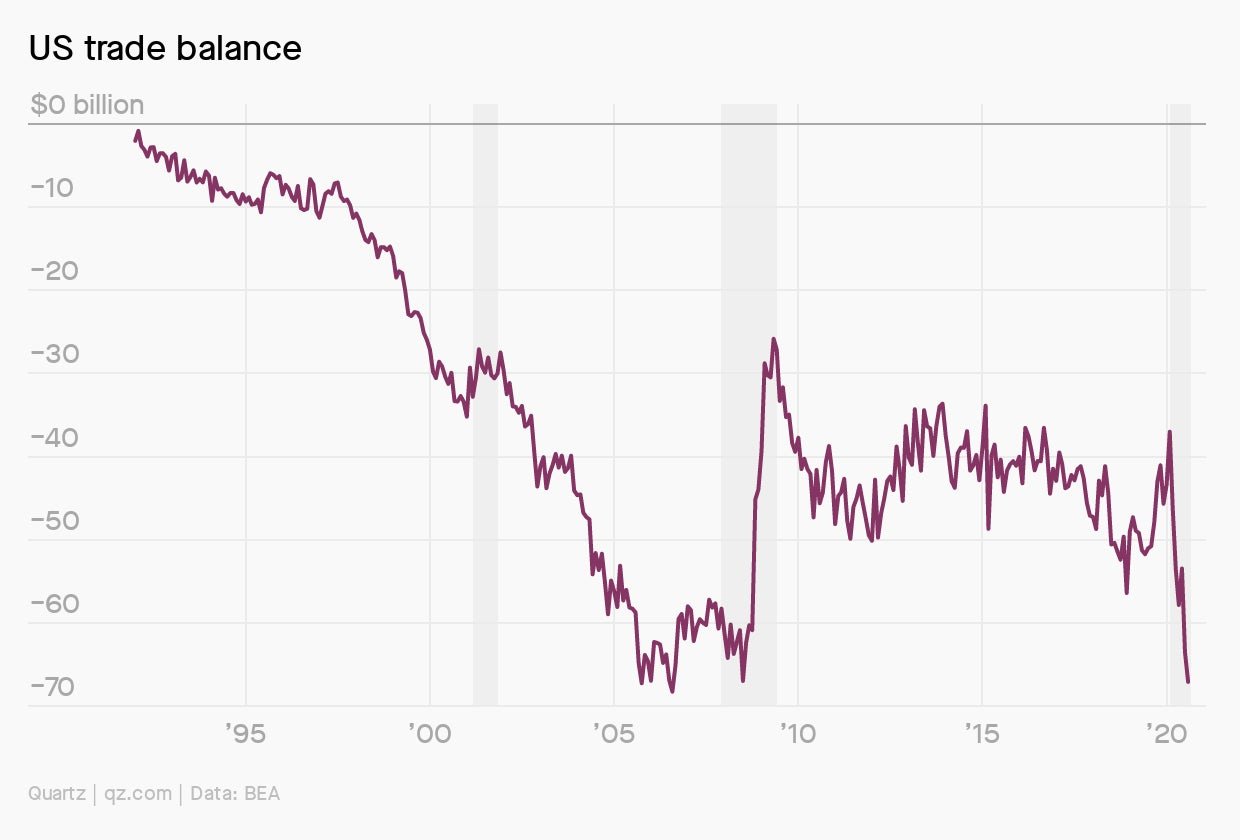Brexit stalemate, fixing contact tracing, bubble mosh pit
Good morning, Quartz readers!

Good morning, Quartz readers!
Here’s what you need to know
Boris Johnson offers an update on his Brexit approach. The British prime minister could reiterate that he is willing to forego a trade deal with the EU after European leaders said yesterday the country needed to make more concessions. The UK’s chief Brexit negotiator David Frost said he was “disappointed” by the European demands, which came on Britain’s self-imposed deadline for a deal that would take effect next year.
Donald Trump and Joe Biden sparred from a distance. The US presidential candidates fielded wildly different questions and offered contrasting visions on the White House’s handling of the coronavirus outbreak at their competing town halls. The broadcast events were held at the same time after the president refused to engage in a virtual debate with former vice president Biden.
China will pass a new law to restrict exports of vital technology. After expanding tech export controls as a tool in the battle with the US over TikTok, the new measure, which could pass tomorrow, will restrict sensitive exports vital to national security. The move comes as the US also strengthens directions to government agencies to protect its technology.
New Zealand and Bolivia vote. Prime minister Jacinda Ardern’s handling of the coronavirus is expected to lead the Labour party to a resounding election victory over her conservative opposition in tomorrow’s election. Meanwhile, citizens in Bolivia appear to be looking to the socialist party of exiled leader Evo Morales, whose disputed win last year ended up leading to Sunday’s presidential re-run.
Charting the US trade deficit
The US trade deficit in goods and services hit $67 billion in August, and if it continues to grow at this pace, it will be the largest it’s ever been.

The primary reason the US typically has such a large trade imbalance is that it’s the world’s reserve currency. People all over the world want to hold dollars. When foreigners sell goods to people in the US, they don’t always use that money to immediately buy stuff from American companies, but rather, because the dollar is such a safe asset, they keep it. That allows Americans to consume more than they produce. Dan Kopf explains more about why a trade deficit isn’t necessarily the worst thing.
Put me in the Zoom, coach

Executive coaching is an estimated $3 billion a year global industry, with the median rate for a coach hovering around $500 an hour. And though revenue in the coaching field might be hurt by the pandemic, it’s still a busy time for executive coaches, as business leaders seek guidance on everything from managing layoffs to navigating racial issues at work.
To accommodate busy clients, coaches have long offered virtual sessions. But with the pandemic, the more deliberate shift to online coaching has still brought change to the industry.
“I think the pandemic has really led people to realize: I need additional support,” says Melody Wilding, an executive specializing in highly sensitive people. She is one of five coaches we checked with for our field guide on consulting’s new challenges.
✦ Let us coach you on something. A Quartz membership is a paywall-free, perk-full experience. Use the promo code QZTWENTY to unlock a 20% discount.
Obsession interlude: Rethinking Cities
Tactical urbanism: A movement using “short-term, low-cost, and scalable interventions to catalyze long-term change” to reshape cities.
Tactical urbanism is not showing up at your local food co-op in fatigues.
Tactical urbanism is pop-up bike lanes, greenbelts, or “slow streets”. These urban infrastructure modifications shift the balance of power between pedestrians and cars, and give cities real-time data to fuel bigger changes down the (literal) road.
The pandemic has forced cities all over the world to reimagine how best to serve those who live and work within them—but it’s not the first time cities have had to pivot, nor will it be the last. Taking a note from tactical urbanism movements from the past can help plan for the future.
Follow our Rethinking Cities obsession to keep up with the way urbanism is changing.
You Asked about contact tracing
Why isn’t contact tracing more effective in the US?
Good question, and a tricky one. It’s not the fault of the tracers themselves: With wait times for diagnostic test results as long as weeks, the window for identifying Covid-19 patients before they have a chance to infect others is vanishingly small.
Now, though, there is an approach that could make contact tracing more effective: rapid antigen testing. Instead of DNA, these diagnostic tests look for proteins on the outer coating of the virus. They’re not as sensitive as PCR tests, meaning they can only detect viral proteins when a person has a high viral load and is, therefore, most infectious, but because they’re cheaper—to the tune of $5 per test—individuals can get tested repeatedly over days or weeks. They require equipment the size of a credit card instead of an entire lab, and results are ready in 15 minutes.
That’s music to contact tracers’ ears. Their job is to call everyone a Covid-19 patient contacted in the 48 hours before they started showing symptoms. Immediate results could mean more accurate tracing: The longer the delay in an index case’s test results, the harder it is for them to remember their contacts. Katherine Ellen Foley goes deeper into antigen tests and the impact they could have on the pandemic.
Surprising discoveries
Flaming Lips invented a socially distanced mosh pit. For their recent concerts, audience members have been encased in giant plastic “space bubbles.”
QR codes have been waiting a long time for… all this. Before the pandemic made the technology essential, QR codes, quite honestly, sucked.
No one watches “Netflix.” Just 3% of the streaming service’s most-watched content over the last six weeks was actually produced by Netflix.
“Buttcheeks” is one word. At least that’s what our friends at Reuters decided with this headline about a Brazilian senator’s cash stash.
Quartz Daily Brief readers win stuff. Share your favorite email (as long as it’s this one) to earn premium Quartz bounty.
Our best wishes for a productive day. Please send any news, comments, quirky QR codes, and grammatical rulings to [email protected]. Get the most out of Quartz by downloading our iOS app and becoming a member. Today’s Daily Brief was brought to you by Jane Li, Tripti Lahiri, Michael Coren, and Max Lockie.